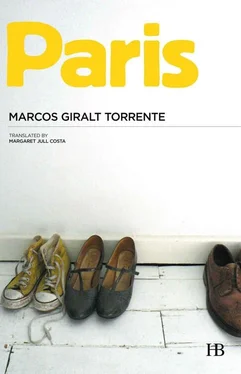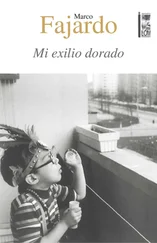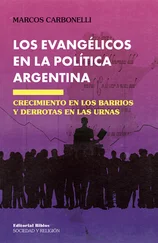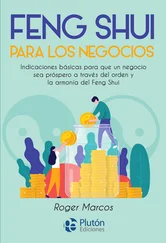Marcos Giralt Torrente - Paris
Здесь есть возможность читать онлайн «Marcos Giralt Torrente - Paris» весь текст электронной книги совершенно бесплатно (целиком полную версию без сокращений). В некоторых случаях можно слушать аудио, скачать через торрент в формате fb2 и присутствует краткое содержание. Год выпуска: 2014, ISBN: 2014, Издательство: Hispabooks, Жанр: Современная проза, на английском языке. Описание произведения, (предисловие) а так же отзывы посетителей доступны на портале библиотеки ЛибКат.
- Название:Paris
- Автор:
- Издательство:Hispabooks
- Жанр:
- Год:2014
- ISBN:9788494228452
- Рейтинг книги:5 / 5. Голосов: 1
-
Избранное:Добавить в избранное
- Отзывы:
-
Ваша оценка:
- 100
- 1
- 2
- 3
- 4
- 5
Paris: краткое содержание, описание и аннотация
Предлагаем к чтению аннотацию, описание, краткое содержание или предисловие (зависит от того, что написал сам автор книги «Paris»). Если вы не нашли необходимую информацию о книге — напишите в комментариях, мы постараемся отыскать её.
Paris — читать онлайн бесплатно полную книгу (весь текст) целиком
Ниже представлен текст книги, разбитый по страницам. Система сохранения места последней прочитанной страницы, позволяет с удобством читать онлайн бесплатно книгу «Paris», без необходимости каждый раз заново искать на чём Вы остановились. Поставьте закладку, и сможете в любой момент перейти на страницу, на которой закончили чтение.
Интервал:
Закладка:
“The problem is that nothing in particular happened to prompt me to tell you. And it’s difficult if there’s nothing putting pressure on you to do something, if nothing happens and only time decides.”
My mother falls silent and looks at me, then decides to pick up the cigarette she had previously rejected. She keeps her eyes fixed on me while she lights it and doesn’t reply to what I’m thinking without saying but that she can doubtless sense. She’s gone back to that same idea, that time decides. I don’t know if it’s true, but just supposing it is, when does time decide? What happens in between so that one day, we know what we didn’t know or hadn’t wanted to know before? There’s no answer, only my mother’s eyes fixed on me as she exhales the first puff of smoke and leans back again in her chair.
“Nothing happened, and yet we both know.”
She’s getting tangled up in her own thoughts and repeating herself, and it’s that inability to progress that seems to me to confirm that she’s lying, or at least not telling the whole truth. She’s finding it hard to justify her inaction. This doesn’t annoy me, it doesn’t interrupt my thought process. I think about Paris and wish she would say something about that. Perhaps she’s right and nothing did happen, but without knowing whether or not she was there with him, I can’t believe it. That void will always be there. Like the void of the name she doesn’t say out loud but is a constant presence. Why then and not now? Time helps only in some respects but is, by its very nature, too insubstantial, too slippery.
“There was no precise date. There was nothing that made any announcement or explanation necessary. I didn’t get married again, and we haven’t changed the way we live. There was no need. Just because something ends doesn’t necessarily mean it has to be replaced by something else.”
My mother falls silent again in order to observe the effect of her words. I hear the tinkle of her bracelets slipping down toward her elbow, and think that perhaps she’s right. I myself have changed. Before, I felt no sense of oppression, and her constant, unconditional presence didn’t weigh on me as it does now, but that change is invisible, it hasn’t been replaced by anything, I haven’t transferred my affections to someone else. I’m the only one who knows about that change. There’s no outward sign of it. Or is there, I wonder, as her bracelets tinkle their way back down her arm and a cloud of smoke rises up above her head. Was the sudden attraction I felt for my father while I was pursuing him down those rainy streets, was that a real change? However momentary and troubling, was the brief sense of identity I felt as we stood there in the street, was that a way of replacing my mother, of confirming that she was no longer unique? I don’t know. I think about it, and it worries me, but I have no answer. Anyway, if it was true, that still wouldn’t resolve all the other unknowns or make what she’s saying any more significant. It isn’t that nothing has happened to make manifest or explicit what we both know without ever having spoken about it. It’s that there’s nothing to explain it. That’s the problem: the fact that nothing has happened to justify it is not the same as the fact that nothing has happened to confirm it. It’s the former that worries me, not the latter. I want to know what else there is apart from time passing. I want her to turn on the light so that I can see her vanishing face.
“Often, there’s no need for any specific motive. Sometimes all it takes for us to stop liking some dish we used to like is a bout of food poisoning or indigestion, but mostly such desertions are spontaneous. Without knowing why, we suddenly can’t abide a gesture made by the person we love most and that we used to find so amusing. Without knowing why, the friends we used to spend our leisure time with suddenly become boring, repetitive. I’m not saying this always happens, but often it’s the simple passage of time that distances us from them.”
My mother stops talking again, as if she didn’t know how to go on, just at the moment when a tiny fragment of ash falls from her cigarette. I watch it glow in the air and burn out before it touches her skirt, and at the same time, I hear the tinkle of her bracelets as her free hand hurriedly brushes the potential danger away, and I feel, as if I could actually hear it, the flow of her thoughts choosing the words she’s about to say.
“Maybe something like that has happened to us. Not only has no external factor urged us to speak about it, there weren’t really any clear reasons to do so. Why then and not now?”
My mother says exactly what I said to myself a few minutes before, and hearing those words on her lips startles me and makes me feel at even more of a disadvantage. It’s the second or third time that she’s responded to something I was thinking, and this, I tell myself, is proof that she has been building up to this conversation for a long time. It can’t be mere chance, she’s clearly thought about it a lot, she’s tried to have all the loose ends tied up before sitting down to talk to me. That’s why I’m listening to her and not believing her, but not feeling irritated, either. I’m aware only of my own incredulity, and I suddenly seem to understand why she doesn’t turn on the light, why she doesn’t even mention doing so. We’re sitting here in the near-darkness, and that’s not normal. She can see me better than I can see her, because she has the fading glow of evening in her favor, but it’s still not normal not to do something about that. She should want there to be light, she should get up and turn on the lamp. She doesn’t, because she feels insecure, she fears that her reasons aren’t convincing me. She’s nervous; I can see what her strategy is, and beneath it, I can see what she’s only thinking but not saying, the definitive void left by the person we don’t name, even though he’s there and he’s the explanation for everything.
“I don’t know why. I didn’t set any limit — this far and no further. He didn’t do anything he hadn’t done before, and I didn’t go against my own feelings as the result of some premeditated decision. I didn’t get up one morning thinking he’d gone too far and that, purely as a matter of survival, I should stop allowing things to continue as they were.”
So why keep talking about it , I wonder as I study the shadowy shape of her head, her hair pulled back, perfectly silhouetted against the darkness. Why not go straight to the thing she doesn’t want to tell me about? Why linger for so long over what didn’t happen? I’m listening to her and not believing her, because I don’t know what I prefer, or what would best alleviate the suffocating effect of those unworldly words focused entirely on me. I’m listening to her and not believing her, because it pains me to not believe her and I prefer to regret being unfair to her to not having that as an option. I realize that I’ve stopped listening, and it’s then that her voice, which was only a murmur, fades for a few seconds, giving her time to think about what she has said or perhaps to observe me, taking advantage of the darkness she has chosen. I can’t help thinking that it’s Paris she’s talking about without talking about it. Paris lies behind it all. It doesn’t matter if they were never there together and that it wasn’t Paris that separated them. The point is that she knows I’m thinking about Paris, that I’m plagued by uncertainty, and still she doesn’t mention it. She’s not going to unless I do, and I have no proof of anything. I’m not sure. I’m in a constant state of doubt. As I was a moment ago. As I am right now, not knowing if she really does know that I’m thinking about Paris.
Читать дальшеИнтервал:
Закладка:
Похожие книги на «Paris»
Представляем Вашему вниманию похожие книги на «Paris» списком для выбора. Мы отобрали схожую по названию и смыслу литературу в надежде предоставить читателям больше вариантов отыскать новые, интересные, ещё непрочитанные произведения.
Обсуждение, отзывы о книге «Paris» и просто собственные мнения читателей. Оставьте ваши комментарии, напишите, что Вы думаете о произведении, его смысле или главных героях. Укажите что конкретно понравилось, а что нет, и почему Вы так считаете.












